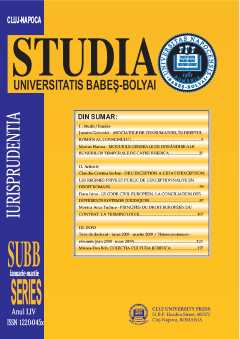MODALITĂŢI PRINCIPALE DE COMITERE A INFRACŢIUNILOR, POTRIVIT JURISPRUDENŢEI INSTANŢELOR PENALE INTERNAŢIONALE
THE MAIN MODES OF LIABILITY FOR CRIME COMMITTING, ACCORDING TO THE JURISPRUDENCY OF INTERNATIONAL CRIMINAL COURTS
Author(s): Liviu-Alexandru LascuSubject(s): Law, Constitution, Jurisprudence
Published by: Studia Universitatis Babes-Bolyai
Keywords: international criminal courts; direct commission; indirect commission; joint criminal enterprise; war crimes; crimes against humanity; aggression; genocide; main modes of liability; derivative modes of liability.
Summary/Abstract: The main modes of liability for crime committing, according to the jurisprudency of international criminal courts: the direct commission or the perpetration; the indirect commission or the commission through another person; the participation in a „joint criminal enterprise”. The mass graves discovered on the territory of the former Yugoslavia, the genocide of Rwanda, the use of children-soldiers, the mass rape and massacre of civil population in many African countries or other countries of the world, not only horrified the international community but also created an unprecedented challenge in modern world history: the prosecution and the trial by international criminal courts of the military and political leaders who are responsible for the commission of these crimes. The international community, U.N. and the leaders of most states have agreed upon the fact that the phenomenon of impunity of those state or military leaders who conceive and orchestrate war crimes, crimes against humanity, aggression and genocide, regardless of the place where they might be committed, has to come to an end. Thus, they considered that the establishment of some criminal courts at an international level is the only viable way to prosecute the perpetrators as long as the states where the crimes occured, either have no genuine will or have no the capacity to do it. These courts, like all others in this respect, aim to convict the persons at the top levels of the structures committing the crimes, as well as to deter the commission of such crimes in the future. The principles of international public law regarding the observance of the states sovereignity and the noninterference in the internal affaires of the states, frequently invoqued during the past centuries as a ground for the lack of involvement of the international community in trying this kind of crimes, can no longer be used nowadays. These crimes, by their magnitude of gravity, are affecting the values of the entire humanity to an extent going beyond the borders of a certain state and therefore the international community’s reaction must be adequate, that is, to act whith disregard to what a national authority decides when it has no will to do the right justice or, it simply cannot do it.
Journal: Studia Universitatis Babes Bolyai - Iurisprudentia
- Issue Year: 57/2012
- Issue No: 1
- Page Range: 110-142
- Page Count: 33
- Language: Romanian

